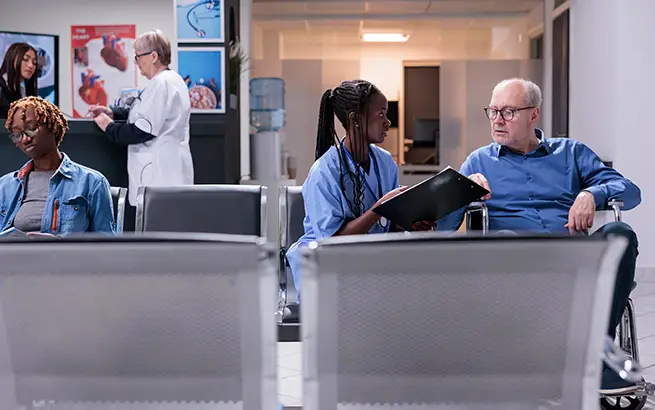Wondering what is a primary care provider (PCP) and how he can guide you on your healthcare journey?
In this guide, we will explore the various types of PCPs, their roles and responsibilities, and the advantages of having a dedicated provider.
And FMRC offers at Goldsboro personalized primary care doctors to prioritize your well-being.
Learn when to see your PCP for ongoing health concerns and how we can help you find the right provider for your needs.
Types of primary Care providers

Several primary healthcare professionals can serve as your primary care provider (PCP). These are the professionals that can be your PCP.
Family Medicine Doctors
Family medicine physicians are trained to provide comprehensive primary care for patients of all ages, from newborns to the elderly.
They can diagnose and treat a wide range of health conditions and provide preventive care services, as they have a wide range of knowledge.
Internal Medicine Doctors
These medicine physicians, also known as internists, specialize in the prevention, diagnosis, and treatment of adult diseases.
They have extensive training in the management of chronic conditions and complex internal health issues.
Pediatricians
Pediatricians are doctors who specialize in the care of children, from birth through puberty to adulthood.
They focus on the physical, emotional, and social well-being of young patients.
They also provide routine check-ups and treatment for childhood illnesses and injuries.
Nurse Practitioners
Nurse practitioners are advanced practice registered nurses who have additional education and training in primary care.
They can diagnose and treat health conditions, order and interpret tests, and prescribe medications.
Physician Assistants
Physician assistants (PAs) are healthcare workers who help doctors and surgeons. They work together with the doctors.
They can perform many of the same tasks as doctors, including conducting physical exams, ordering tests, and prescribing medications.
Roles and Responsibilities of a PCP

When you visit a primary care provider (PCP), you can expect them to take on various roles and responsibilities to help manage your health effectively.
Diagnosis of Illnesses and Injuries
If you are feeling unwell or have an injury, your PCP will assess your symptoms.
Then he will provide a diagnosis, and recommend appropriate treatment options for that illness or injury.
The treatment may include medications, lifestyle changes, or referrals to specialists.
Chronic Disease Management
Individuals with chronic conditions like bronchitis and sinus infections, urinary tract infections (UTIs), or ear infections.
So your PCP will work with you to develop a treatment plan, monitor your conditions regularly, and adjust your care as needed to keep your health good.
Advantages of Having a Primary Care Provider

Having a primary care provider (PCP) offers numerous advantages that can positively impact your health and well-being in various ways.
- When you have a doctor you see regularly, you are more likely to get regular health checks, stay healthy, and catch any problems early.
- Regular check-ups can help prevent emergencies, leading to fewer hospital trips.
- Your doctor provides detailed care, focusing on your health needs and coordinating with specialists for comprehensive care.
For primary care at FMRC, we stress the importance of regular doctor visits for these benefits, offering top-notch primary care services for your well-being at Morehead and Knightdale.
How Can FMRC Help You Find a Primary Care Provider?

At FMRC, we offer primary care services provided by a team of experienced and compassionate healthcare professionals.
Our direct primary care model allows us to provide personalized, high-quality primary care to our patients without the hassle of insurance paperwork or hidden fees.
When You Have to See a PCP
There are specific situations when it is important to schedule an appointment with your primary care provider (PCP) to address your health concerns.
Ongoing Health Problems
If you have long-term health issues such as bronchitis and sinus infections, urinary tract infections (UTIs), or ear infections. Then it is crucial to see your regular doctor often to check on these conditions.
Conclusion
In summary, having a primary care provider (PCP) is crucial for maintaining good health.
By understanding the different types of PCPs and their roles, you can make informed decisions about your healthcare.
After knowing this information, you will know What is a primary care provider? And you will be able to know how they work.
FMRC offers personalized primary care services to help you find the right primary care provider and prioritize your well-being.
FAQ’s
What is primary care?
Primary care involves managing your daily health needs and maintaining your overall well-being.
Why choose FMRC for primary care?
FMRC offers personalized and high-quality primary care services, ensuring your well-being is a top priority. We are also providing the services at Cary.
What is a primary care physician?
A primary care physician (PCP) is your first point of contact for medical care, managing general health concerns, and coordinating specialized care if needed.















